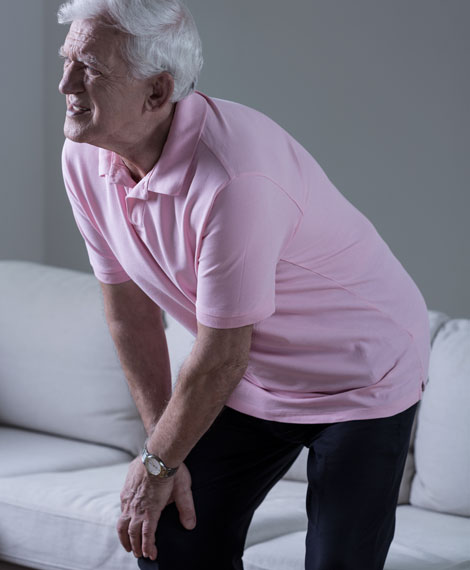Knee Pain

Knee pain can be caused by problems with the knee joint itself, or it can be caused by conditions affecting the soft tissues — ligaments, tendons or bursae — that surround the knee. The severity of knee pain can vary widely. Some people may feel only a slight twinge, while others may experience debilitating knee pain that interferes with their day-to-day activities. In most cases, self-care measures can help you cope with knee pain.
Causes
Knee pain causes include:
- ACL injury (Anterior cruciate ligament injury)
- Avascular necrosis
- Baker's cyst
- Broken leg
- Collateral ligament injury
- Dislocation
- Gout
- Iliotibial band syndrome
- Knee bursitis
- Lupus
- Medial collateral ligament injury
- Osgood-Schlatter disease
- Osteoarthritis
- Osteochondritis dissecans
- Osteomyelitis
- Patellar tendinitis
- Patellofemoral pain syndrome
- Posterior cruciate ligament injury
- Pseudogout
- Referred pain from hip area
- Septic arthritis
- Tendinitis
- Torn meniscus
Treatment
Long-term knee pain from arthritis is often helped by weight loss and exercises to strengthen the muscles around the joint. Other self-care options include:
- Rest: Avoid more-strenuous or painful activities, but keep active. Try alternate activities that cause less discomfort — swimming instead of jogging, bicycling instead of tennis. For acute injuries, you may have to stay off your feet as much as possible or even use crutches for a short time.
- Ice: Put ice on your knee for 15 to 20 minutes a few times each day. Use ice cubes or a bag of frozen vegetables wrapped in a towel.
- Compression: Wrap an elastic bandage around your knee to help control swelling. Make the bandage fit snugly around your knee, but not tight enough to cause pain or leg swelling.
- Elevation: Lying down with your knee propped up on pillows may help control pain and swelling.
- NSAIDs: Over-the-counter nonsteroidal anti-inflammatory drugs (NSAIDs) may help relieve pain, swelling and inflammation. These include ibuprofen (Advil, Motrin IB, others) and naproxen sodium (Aleve). These types of drugs can cause stomach upset. If you have kidney trouble or high blood pressure or if you are an older adult, you should use acetaminophen (Tylenol) instead.
Make an appointment with your doctor if your knee pain was caused by a particularly forceful impact or if it's accompanied by:
- Significant swelling or pain
- Redness
- Tenderness and warmth around the joint
- Fever
If you've had minor knee pain for some time, make an appointment with your doctor if the pain worsens to the point that it interferes with your usual activities or sleep.
Ask someone to drive you to urgent care or the emergency room if your knee pain is caused by an injury and is accompanied by:
- A joint that appears deformed
- A popping noise at the time your knee was injured
- Inability to bear weight
- Intense pain
- Sudden swelling
At Restore Medical Partners, we are able to treat knee pain with a variety of modalities, including steroid knee injections, and Genicular Nerve Blocks & Ablation.
REFERENCES:
http://www.mayoclinic.org/tests-procedures/radiofrequency-neurotomy/basics/definition/prc-20013452


